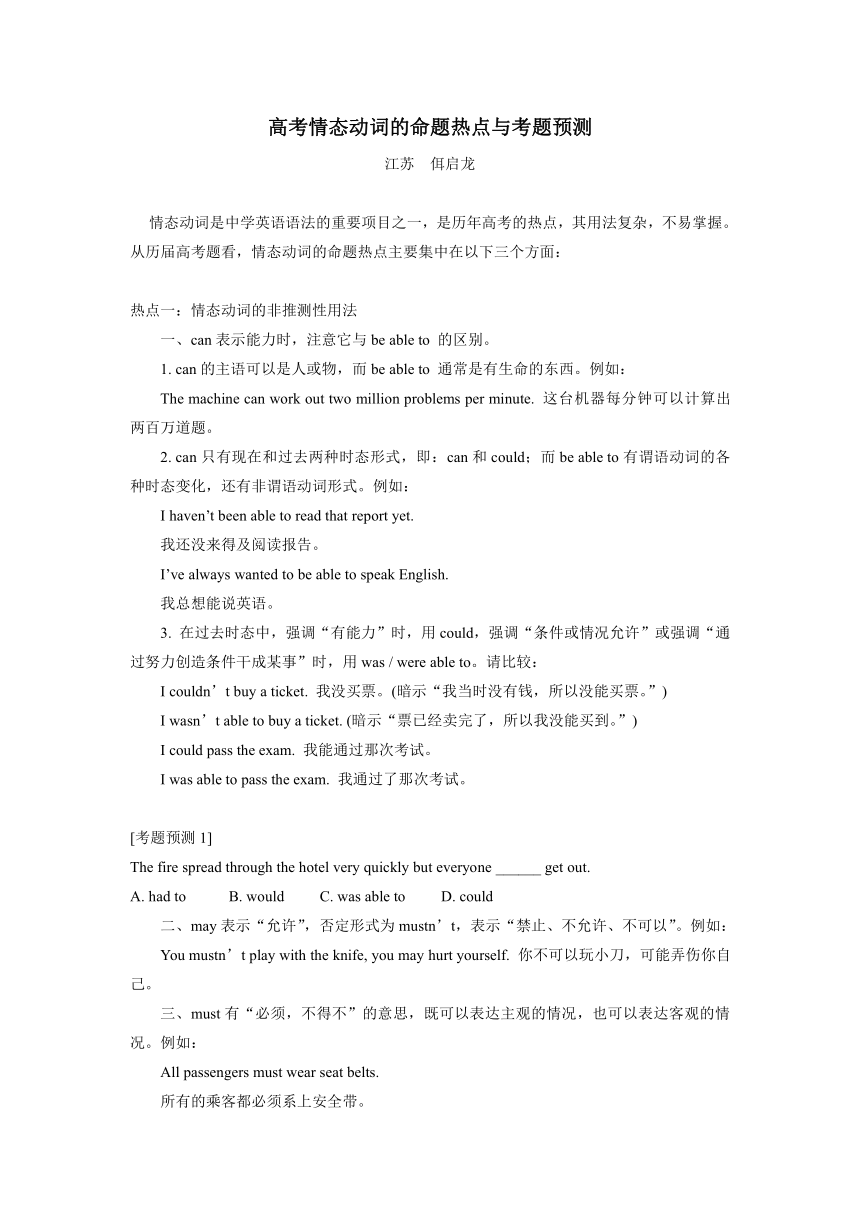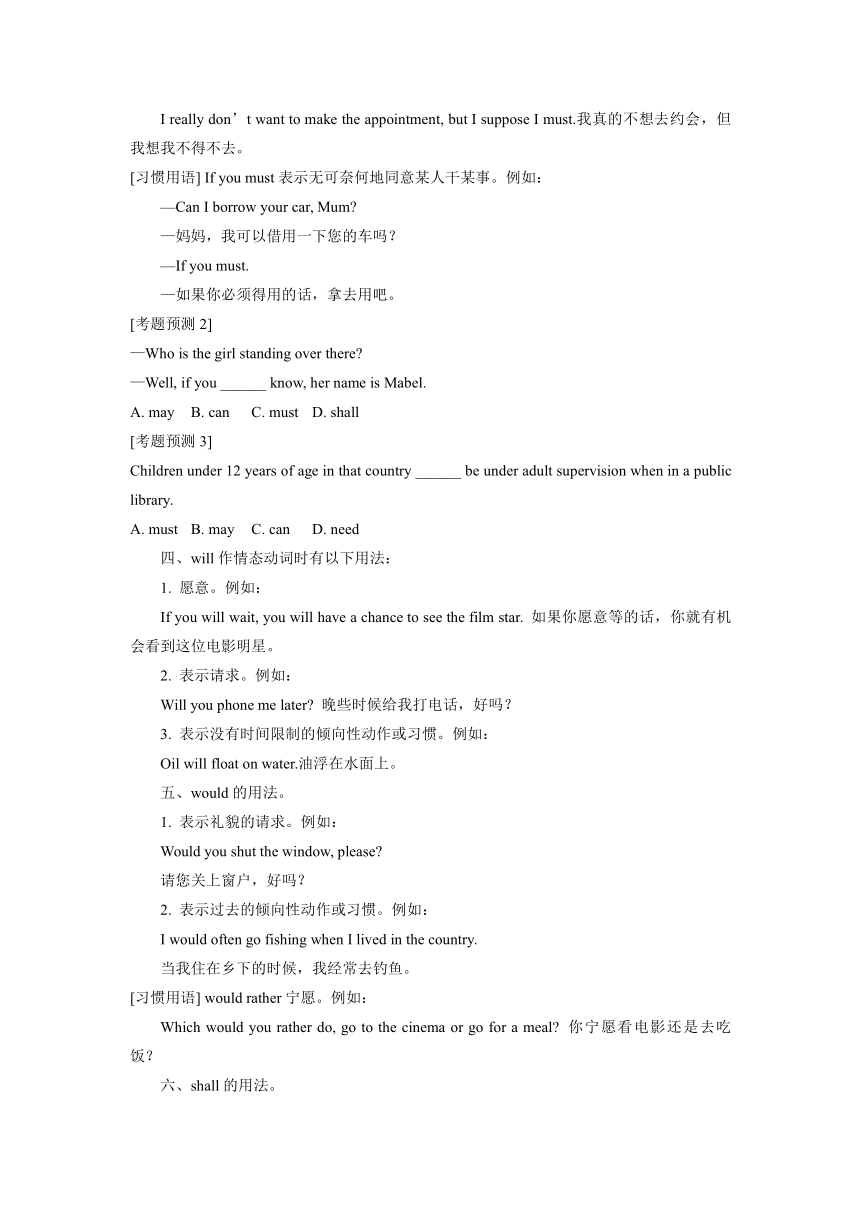情态动词高考考点考前预测[下学期]
图片预览


文档简介
高考情态动词的命题热点与考题预测
江苏 佴启龙
情态动词是中学英语语法的重要项目之一,是历年高考的热点,其用法复杂,不易掌握。从历届高考题看,情态动词的命题热点主要集中在以下三个方面:
热点一:情态动词的非推测性用法
一、can表示能力时,注意它与be able to 的区别。
1. can的主语可以是人或物,而be able to 通常是有生命的东西。例如:
The machine can work out two million problems per minute. 这台机器每分钟可以计算出两百万道题。
2. can只有现在和过去两种时态形式,即:can和could;而be able to有谓语动词的各种时态变化,还有非谓语动词形式。例如:
I haven’t been able to read that report yet.
我还没来得及阅读报告。
I’ve always wanted to be able to speak English.
我总想能说英语。
3. 在过去时态中,强调“有能力”时,用could,强调“条件或情况允许”或强调“通过努力创造条件干成某事”时,用was / were able to。请比较:
I couldn’t buy a ticket. 我没买票。(暗示“我当时没有钱,所以没能买票。”)
I wasn’t able to buy a ticket. (暗示“票已经卖完了,所以我没能买到。”)
I could pass the exam. 我能通过那次考试。
I was able to pass the exam. 我通过了那次考试。
[考题预测1]
The fire spread through the hotel very quickly but everyone ______ get out.
A. had to B. would C. was able to D. could
二、may表示“允许”,否定形式为mustn’t,表示“禁止、不允许、不可以”。例如:
You mustn’t play with the knife, you may hurt yourself. 你不可以玩小刀,可能弄伤你自己。
三、must有“必须,不得不”的意思,既可以表达主观的情况,也可以表达客观的情况。例如:
All passengers must wear seat belts.
所有的乘客都必须系上安全带。
I really don’t want to make the appointment, but I suppose I must.我真的不想去约会,但我想我不得不去。
[习惯用语] If you must表示无可奈何地同意某人干某事。例如:
—Can I borrow your car, Mum
—妈妈,我可以借用一下您的车吗?
—If you must.
—如果你必须得用的话,拿去用吧。
[考题预测2]
—Who is the girl standing over there
—Well, if you ______ know, her name is Mabel.
A. may B. can C. must D. shall
[考题预测3]
Children under 12 years of age in that country ______ be under adult supervision when in a public library.
A. must B. may C. can D. need
四、will作情态动词时有以下用法:
1. 愿意。例如:
If you will wait, you will have a chance to see the film star. 如果你愿意等的话,你就有机会看到这位电影明星。
2. 表示请求。例如:
Will you phone me later 晚些时候给我打电话,好吗?
3. 表示没有时间限制的倾向性动作或习惯。例如:
Oil will float on water.油浮在水面上。
五、would的用法。
1. 表示礼貌的请求。例如:
Would you shut the window, please
请您关上窗户,好吗?
2. 表示过去的倾向性动作或习惯。例如:
I would often go fishing when I lived in the country.
当我住在乡下的时候,我经常去钓鱼。
[习惯用语] would rather宁愿。例如:
Which would you rather do, go to the cinema or go for a meal 你宁愿看电影还是去吃饭?
六、shall的用法。
1. 用于第一、三人称的问句中,表示征求建议。例如:
What shall I get for dinner 晚饭买点什么来吃?
2. 用于第二、三人称,表示命令、警告、威胁。例如:
You shall do it at once! 你必须马上做这件事!
3. 用于官方文件中,表明具有法律效力。例如:
All payments shall be paid by the end of the month. 本月底所有款项必须付清。
[考题预测4]
“The interest ______ be divided into five parts, according to the agreement made by both sides,” declared the judge.
A. may B. should C. must D. shall
七、should 表示“应该”。例如:
He should learn to be more polite.
他应该学会更讲礼貌。
[考题预测5]
I ______ pay Tracy a visit, but I am not sure whether I will have time this Sunday.
A. should B. might
C. would D. could
八、need表示“需要”的用法。
need 既可以作情态动词也可以作实义动词。作情态动词时,通常用于疑问句、否定句或条件句中,作实义动词时,句型不受限制。请比较:
We need to work hard. 我们需要努力工作。
You needn’t worry. = You don’t need to worry.
你不必担心。
[注意]needn’t = don’t have to 不必。
[考题预测6]
—Shall I tell John about it
—No, you ______. I’ve told him already.
A. needn’t B. wouldn’t
C. mustn’t D. shouldn’t
[考题预测7]
—I don’t mind telling you what I know.
—You ______. I’m not asking you for it.
A. mustn’t B. may not
C. can’t D. needn’t
热点二:情态动词的推测性用法
情态动词 must, will, would, ought to, should, may, might都有推测性用法,其可能性程度按其排列顺序由强到弱,可以翻译成:“肯定,会,应该,可能”等意。这些词语通常用于肯定句中,否定句和疑问句中用can 或could。这些词语本身不表达时态意义,而其后面的动词才表达时态意义。下面以do 为例加以说明:must do表示“现在肯定做某事”;must be doing表示“现在肯定正在做某事”;must have done表示“过去肯定已经干了某事”。例如:
—Who is that man Can it be your uncle
那人是谁?可能是你叔叔吗?
—No, it can’t be him. 不可能是他。
It’s nine o’clock now. They must be working in the factory. 九点了,他们肯定正在工厂干活呢。
I didn’t hear the phone. I must have been asleep.
我没有听见电话,当时我肯定睡着了。
[注意] can 也可以在肯定句中表示可能性,但这种可能性往往具有一般性,说话人是按常理在进行推测。而may, could则是根据说话人当时的具体情况进行推测。例如:
I’m confident that a solution can be found.
我相信会找到解决办法的。
Martin may be able to help. 也许马丁会帮忙的。
[考题预测8]
—Isn’t that Ann’s husband over there
—No, it ______ be him. I’m sure he doesn’t wear glasses.
A. can’t B. must not
C. won’t D. may not
[考题预测9]
—Excuse me, is this the right way to the Summer Palace
—Sorry, I am not sure. But it ______ be.
A. might B. will C. must D. can
热点三:情态动词完成式表示后悔与责备的用法
should / ought to + have done,表示过去应该干而没有干。例如:
You are late again. You should have got up earlier this morning. 你又迟到了。今天早上你该早点起床。
may / might +have done,表示过去本来可以干某事而没有干。例如:
He might have given you more help, even though he was busy. 即使他很忙,他也可以给你更多的帮助。
could + have done,表示过去本能够干而没有干。例如:
I could have walked to the square. It was so near.
我完全能够步行去广场的,这么近。
[考题预测10]
—I’ll tell Mary about her new job tomorrow.
—You ______ her last week.
A. ought to tell B. would have told
C. must tell D. should have told
江苏 佴启龙
情态动词是中学英语语法的重要项目之一,是历年高考的热点,其用法复杂,不易掌握。从历届高考题看,情态动词的命题热点主要集中在以下三个方面:
热点一:情态动词的非推测性用法
一、can表示能力时,注意它与be able to 的区别。
1. can的主语可以是人或物,而be able to 通常是有生命的东西。例如:
The machine can work out two million problems per minute. 这台机器每分钟可以计算出两百万道题。
2. can只有现在和过去两种时态形式,即:can和could;而be able to有谓语动词的各种时态变化,还有非谓语动词形式。例如:
I haven’t been able to read that report yet.
我还没来得及阅读报告。
I’ve always wanted to be able to speak English.
我总想能说英语。
3. 在过去时态中,强调“有能力”时,用could,强调“条件或情况允许”或强调“通过努力创造条件干成某事”时,用was / were able to。请比较:
I couldn’t buy a ticket. 我没买票。(暗示“我当时没有钱,所以没能买票。”)
I wasn’t able to buy a ticket. (暗示“票已经卖完了,所以我没能买到。”)
I could pass the exam. 我能通过那次考试。
I was able to pass the exam. 我通过了那次考试。
[考题预测1]
The fire spread through the hotel very quickly but everyone ______ get out.
A. had to B. would C. was able to D. could
二、may表示“允许”,否定形式为mustn’t,表示“禁止、不允许、不可以”。例如:
You mustn’t play with the knife, you may hurt yourself. 你不可以玩小刀,可能弄伤你自己。
三、must有“必须,不得不”的意思,既可以表达主观的情况,也可以表达客观的情况。例如:
All passengers must wear seat belts.
所有的乘客都必须系上安全带。
I really don’t want to make the appointment, but I suppose I must.我真的不想去约会,但我想我不得不去。
[习惯用语] If you must表示无可奈何地同意某人干某事。例如:
—Can I borrow your car, Mum
—妈妈,我可以借用一下您的车吗?
—If you must.
—如果你必须得用的话,拿去用吧。
[考题预测2]
—Who is the girl standing over there
—Well, if you ______ know, her name is Mabel.
A. may B. can C. must D. shall
[考题预测3]
Children under 12 years of age in that country ______ be under adult supervision when in a public library.
A. must B. may C. can D. need
四、will作情态动词时有以下用法:
1. 愿意。例如:
If you will wait, you will have a chance to see the film star. 如果你愿意等的话,你就有机会看到这位电影明星。
2. 表示请求。例如:
Will you phone me later 晚些时候给我打电话,好吗?
3. 表示没有时间限制的倾向性动作或习惯。例如:
Oil will float on water.油浮在水面上。
五、would的用法。
1. 表示礼貌的请求。例如:
Would you shut the window, please
请您关上窗户,好吗?
2. 表示过去的倾向性动作或习惯。例如:
I would often go fishing when I lived in the country.
当我住在乡下的时候,我经常去钓鱼。
[习惯用语] would rather宁愿。例如:
Which would you rather do, go to the cinema or go for a meal 你宁愿看电影还是去吃饭?
六、shall的用法。
1. 用于第一、三人称的问句中,表示征求建议。例如:
What shall I get for dinner 晚饭买点什么来吃?
2. 用于第二、三人称,表示命令、警告、威胁。例如:
You shall do it at once! 你必须马上做这件事!
3. 用于官方文件中,表明具有法律效力。例如:
All payments shall be paid by the end of the month. 本月底所有款项必须付清。
[考题预测4]
“The interest ______ be divided into five parts, according to the agreement made by both sides,” declared the judge.
A. may B. should C. must D. shall
七、should 表示“应该”。例如:
He should learn to be more polite.
他应该学会更讲礼貌。
[考题预测5]
I ______ pay Tracy a visit, but I am not sure whether I will have time this Sunday.
A. should B. might
C. would D. could
八、need表示“需要”的用法。
need 既可以作情态动词也可以作实义动词。作情态动词时,通常用于疑问句、否定句或条件句中,作实义动词时,句型不受限制。请比较:
We need to work hard. 我们需要努力工作。
You needn’t worry. = You don’t need to worry.
你不必担心。
[注意]needn’t = don’t have to 不必。
[考题预测6]
—Shall I tell John about it
—No, you ______. I’ve told him already.
A. needn’t B. wouldn’t
C. mustn’t D. shouldn’t
[考题预测7]
—I don’t mind telling you what I know.
—You ______. I’m not asking you for it.
A. mustn’t B. may not
C. can’t D. needn’t
热点二:情态动词的推测性用法
情态动词 must, will, would, ought to, should, may, might都有推测性用法,其可能性程度按其排列顺序由强到弱,可以翻译成:“肯定,会,应该,可能”等意。这些词语通常用于肯定句中,否定句和疑问句中用can 或could。这些词语本身不表达时态意义,而其后面的动词才表达时态意义。下面以do 为例加以说明:must do表示“现在肯定做某事”;must be doing表示“现在肯定正在做某事”;must have done表示“过去肯定已经干了某事”。例如:
—Who is that man Can it be your uncle
那人是谁?可能是你叔叔吗?
—No, it can’t be him. 不可能是他。
It’s nine o’clock now. They must be working in the factory. 九点了,他们肯定正在工厂干活呢。
I didn’t hear the phone. I must have been asleep.
我没有听见电话,当时我肯定睡着了。
[注意] can 也可以在肯定句中表示可能性,但这种可能性往往具有一般性,说话人是按常理在进行推测。而may, could则是根据说话人当时的具体情况进行推测。例如:
I’m confident that a solution can be found.
我相信会找到解决办法的。
Martin may be able to help. 也许马丁会帮忙的。
[考题预测8]
—Isn’t that Ann’s husband over there
—No, it ______ be him. I’m sure he doesn’t wear glasses.
A. can’t B. must not
C. won’t D. may not
[考题预测9]
—Excuse me, is this the right way to the Summer Palace
—Sorry, I am not sure. But it ______ be.
A. might B. will C. must D. can
热点三:情态动词完成式表示后悔与责备的用法
should / ought to + have done,表示过去应该干而没有干。例如:
You are late again. You should have got up earlier this morning. 你又迟到了。今天早上你该早点起床。
may / might +have done,表示过去本来可以干某事而没有干。例如:
He might have given you more help, even though he was busy. 即使他很忙,他也可以给你更多的帮助。
could + have done,表示过去本能够干而没有干。例如:
I could have walked to the square. It was so near.
我完全能够步行去广场的,这么近。
[考题预测10]
—I’ll tell Mary about her new job tomorrow.
—You ______ her last week.
A. ought to tell B. would have told
C. must tell D. should have told
